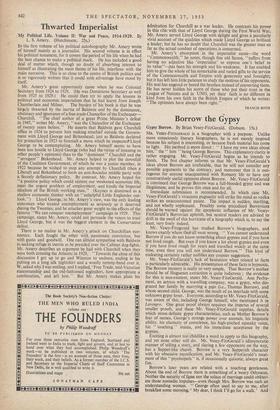Thwarted Imperialist
IN the first volume of his political autobiography Mr. Amery wrote of himself mainly as a journalist. His second volume is in effect his political testament, for it covers the period of his life when he had the best chance to make a political mark. He has included a good deal of matter which, though no doubt of absorbing interest to himself as illustrating the main theme of his life, interferes with the main narrative. This is so close to the centre of British politics and is so vigorously written that it could with advantage have stood by itself.
Mr. Amery's great opportunity came when he was Colonial Secretary from 1924 to 1929. (He was Dominions Secretary as well from 1925 to 1929.) He could then try to apply the lessons in political and economic imperialism that he had learnt from Joseph Chamberlain and Milner. The burden of his book is that he was largely thwarted by the inertia of Baldwin and by the dominance, obstinacy and ignorance of a free-trade Chancellor of the Exchequer— Churchill. "The chief author of a great Prime Minister's defeat in 1945," writes Mr. Amery, "was the Chancellor of the Exchequer of twenty years before." He asserts that Baldwin gave Churchill office in 1924 to prevent him making mischief outside the Govern- ment with Lloyd george and Birkenhead; just as Baldwin declared for protection in 1923 to forestall a move which he suspectedftloyd George to be contemplating. Mr. Amery himself seems to have been less hostile to Lloyd George (who had the virtue of listening to other people's opinions) than to the "dominant" Churchill and the "arrogant" Birkenhead. Mr. Amery helped to plot the downfall of the Coalition Government, of which he was a junior member, in 1922 because he wished to stop any attempt by Churchill (then a Liberal) and Birkenhead to form an anti-Socialist middle party with a fiercely deflationary policy. By contrast, Mr. Amery hoped for "a positive policy which could restore our weakened economic life, meet the urgent problem of employment, and kindle the Imperial idealism of the British working man." (Keynes is dismissed as a shallow economic thinker with an "unhelpful Little Englander out- look.") Lloyd George,' in Mr. Amery's view, was the only leading statesman who treated unemployment as seriously as it deserved during the Twenties, and he attaches great weight to the effects of the famous "We can conquer unemployment" campaign in 1929. This campaign, states Mr. Amery, could not persuade the voters to trust Lloyd George, but it was the biggest element in the Conservative defeat.
There is no malice in Mr. Amery's attack on Churchillian eco- nomics. Each fought the other with passionate conviction, but with gusto and goodwill. One can almost sympathise with Baldwin in seeking refuge in inertia as he presided over the Cabinet dog-fights. Mr. Amery describes an argument he had with Churchill when they were both crossing the Atlantic in 1929. "Towards the close of this discussion I got up to go and Winston to undress, ending in his putting on a long silk nightshirt and a woolly tummy-band over it. W. asked why I was smiling, and I replied, 'Free Trade, mid-Victorian statesmanship and the old-fashioned nightshirt, how appropriate a combination,' and left him." But Mr. Amery makes plain his Admiration for Churchill as a war leader. He contrasts his power in this role with that of Lloyd George during the First World War. Mr. Amery served Lloyd George with delight and gives a peculiarly vivid account of the qualities which made Lloyd George so brilliant a leader; but he has no doubt that Churchill was the greater man so far as the actual conduct of operations is concerned.
Mr. Amery's absorption in the imperialist cause—the word "Commonwealth," he notes, though fine old Saxon, "suffers from having no adjective like 'imperialist' to express one's belief in its value"—lhas been his strength and his weakness. It has enabled him to give the whole of his remarkable and varied gifts to the service of the Commonwealth and Empire with generosity and foresight; but it has left him little patience to study the motives of his opponents. His zeal has angered or bored the heathen instead of converting them. He has never hidden his scorn of those who put their trust in the League of Nations and in UNO, yet their faith is no different in kind from his own faith in the British Empire of which he writes: "The optimists have always been right."
FRANCIS BOYD
































 Previous page
Previous page